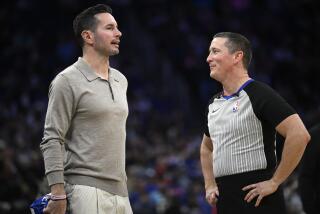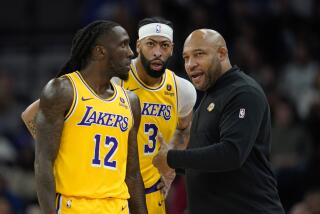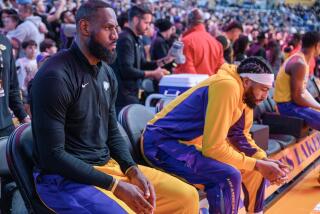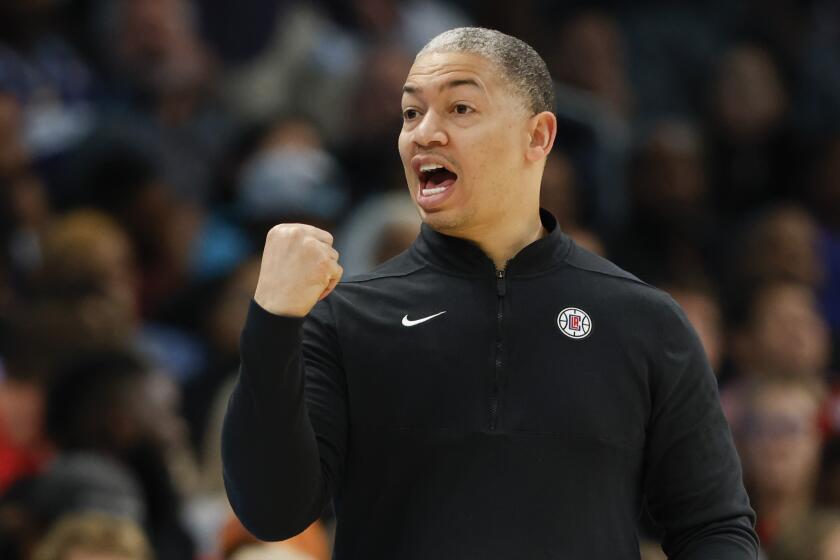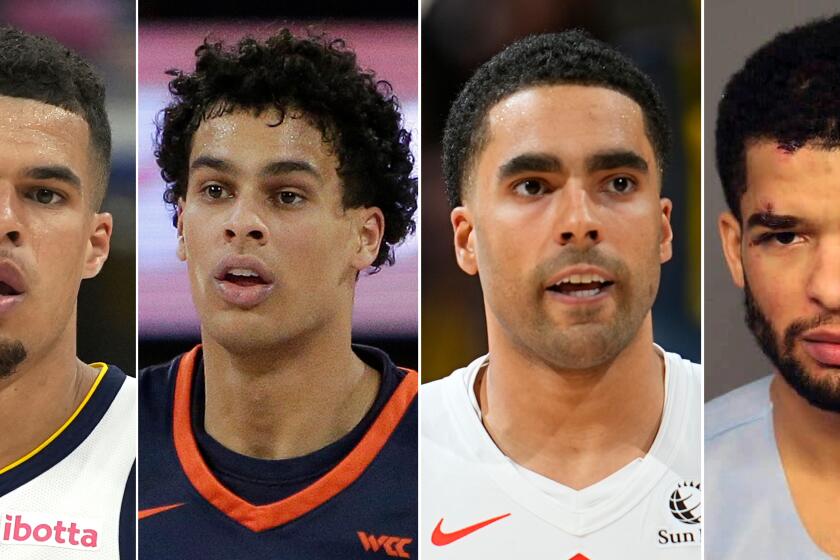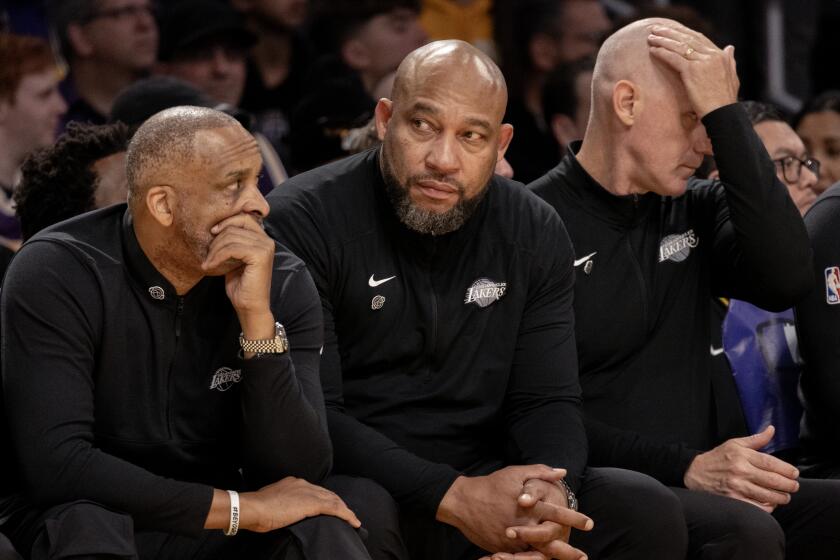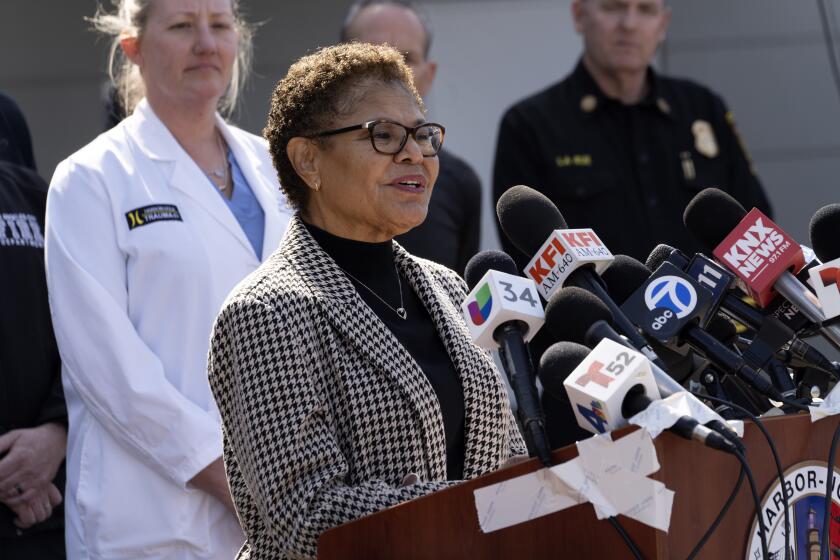GONE, NOT FORGOTTEN
Nearly an hour before the start of Game 2, a buzz began to grow around Staples Center when legendary center Bill Russell appeared.
With each step, Russell attracted more and more attention until it finally seemed that everyone in the arena, including players for both the Lakers and Detroit Pistons, had their eyes on him.
And that’s the way it should be, according to Commissioner David Stern, who began the NBA’s Legends Tour two years ago to help promote great players of the past.
“We look for every opportunity to bring out our legends,” Stern said before Tuesday’s game. “First year we did it with a legend in his own mind; that was Bill Walton’s Tour, 30 games in 30 days. But last year we did the Legends, and it was so well received, we said, we’ve got to do it again.”
Russell, who won 11 NBA championships in 13 seasons playing for the Boston Celtics, is one of several former NBA greats who have been propped up by the league during this season’s playoffs.
“One of the remarkable things David Stern has done is market the game,” said Russell, who has been a coach, general manager and color analyst since he retired as a player in 1969. “He’s made the NBA a marketing force.... It’s entertainment now almost as much -- but not quite -- as competition.”
Among those joining Russell as league ambassadors have been Bob Pettit, Bill Bradley, Kareem-Abdul Jabbar, Walt Frazier, Bob Lanier, Julius Erving, Moses Malone, Robert Parish, Rick Barry, Spencer Haywood, Clyde Drexler, Artis Gilmore, George McInnis, Rick Mahorn, Reggie Theus, Spud Webb, David Thompson and Walton. They have shared their experiences of playing when the NBA wasn’t the NBA that we know today.
They were the athletes who played when the league had considerably fewer teams than the 30 it will have next season with the addition of the Charlotte Bobcats.
They were the athletes who played when the NBA was desperate for media coverage and seldom played championship games that were televised in prime time. They were the ones who paved the way for today’s superstars while playing for a lot less money.
“It’s so ironic because in those days, the players had to chase the reporters in order to get ink,” Frazier said. “Now, guys run the other way when they see reporters.... But back then, guys had to do those things in order to get some ink. After games, we didn’t have any press conference, even in the playoffs. During the season, there would be games when only one reporter came into the locker room. That certainly is not the case now.”
But the league’s past heroes don’t express bitterness. They understand that the more the league grows, the more attention they receive as former players.
Their main problem is that video footage of their playing days is rare, so they don’t blame the game’s younger players for not knowing much about them.
“I’ve probably met 80 to 90% of the guys who are playing now and generally, I’ve found them to be a super bunch of kids,” Russell said. “They have the same kind of problems that we all had when we were young and crazy.
“This generation is the first generation to go through things that have never happened before. The teenagers and the kids now are really the first generation that doesn’t have the responsibility to do better than their parents. So they have a different take on things.”
Said Walton: “There’s nothing like the NBA family and David Stern has done a tremendous job of building up that whole concept of family. He understands how important it is to build that family spirit; the loyalty for when all of the old guys come back. They are really the pioneers. They are the guys who sacrificed when they had no idea that [the league] would develop like this.”
For former greats Walton and Frazier, who have gone on to successful careers as announcers after retiring as players, the attention isn’t new because they’ve never been too far from the spotlight. But for other former All-Stars, who’ve been out of the national spotlight, the exposure they’ve received has been truly special.
The former players not only get a chance to be seen at playoff games, but they also participate in community events and have an opportunity to interact with many of today’s All-Stars.
The Legends know that it wasn’t that long ago when NBA critics said that the league would not survive without Michael Jordan. Before that, the same thing was said about Magic Johnson and Larry Bird.
Russell has no problem with the way today’s players have profited from the league’s success.
“Sure, there’s more money but not like you think when you look at the big picture,” Russell said. “My first full year [1956], I was making about $25,000 a year and you could buy a Cadillac for $3,000. So in other words, the money has always been disproportionate to the normal society.”
Some of today’s players “haven’t really sat down and thought about why they are connected like they are, but that comes with maturity,” Russell said.
And with maturity, legends are made.
More to Read
All things Lakers, all the time.
Get all the Lakers news you need in Dan Woike's weekly newsletter.
You may occasionally receive promotional content from the Los Angeles Times.
